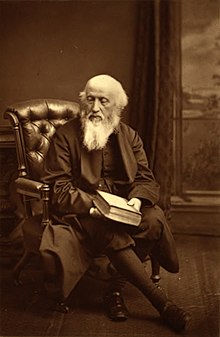Dorset dialect
[1][2] The rural dialect is still spoken in some villages however and is kept alive in the poems of William Barnes and Robert Young.
[1][3][4] Dorset (or archaically, Dorsetshire) is a county in South West England on the English Channel coast.
[5] It was mainly spoken in the Blackmore Vale in North Dorset, not so prevalent in the south of the county and less so in the south-east, which was historically in Hampshire prior to local government re-organisation in 1974.
[6] The Anglo-Saxon Chronicle records that Jutes occupied the area before the Saxons arrived and there are a number of Kentish words entrenched in the Dorset language, 'dwell' for example.
[2] Dorset is a medium-sized county in the South West of England which has a distinct accent and dialect.
Some of the distinct features of the accent include: H-dropping, glottalization, rhoticity and accentuated vowel sounds.
[vague] Therefore words like burst, first, force and verse, are pronounced bu'st, vu'st, fwo'ss and ve'ss.
[16] Words in the FACE lexical set are generally spoken with the [jɛ] diphthong,[17][18] such as in bake, cake, late and lane.
[18][20] In a few words where ⟨a⟩ precedes ⟨r⟩, as in arm, charm and garden, the vowel sound is pronounced as [iə] or [jaː].
[18][21] The short /ʌ/ sound in words such as dust, crust and rut is usually pronounced in the Dorset dialect as an [ə:u] diphthong to make dowst, crowst and rowt.
I wish vo’k always mid auvord Hot meals upon a woakèn bwoard, As good as think that took my cup An’ trencher all my growèn up.
Things that have no fixed shape or form, such as sand, water, dust etc, more or less follow the rules of standard English, in that they take the pronoun "it".
[34] Coupled with the accentuated pronunciation of the vowels this makes for a smooth, flowing dialect by diluting the hard consonants in the language.
[35] Puns, humour which exploits the similar sounds of two different words, rarely work in the Dorset dialect.
[5] Some phrases are alternative versions of common English idioms, such as, Don't teach yer grandma to spin equivalent to standard English, 'Don't teach your grandmother to suck eggs', and Zet the fox to keep the geese similar to 'Putting the fox in charge of the henhouse', but others are peculiar to Dorset.
[39] There are many words to refer to 'a bite to eat', it is said that a Dorset man has eight meals a day; dewbit, breakfast, nuncheon, cruncheon, luncheon, nammet, crammet and supper.
Where there was no Saxon equivalent for modern terms, Barnes would retronymically concoct words and phrases, such as 'push wainling' for perambulator.
[47] Another poet who wrote in the local dialect was Robert Young whose work includes, "Rabin Hill's Visit to the Railway: What he Zeed and Done, and What he Zed About It", published in two parts in 1864, and "Rabin Hill's Excursion to Western-Super-Mare to see the Opening of the New Peir", published in 1867.
[49] J. K. Rowling used the Dorset dialect word for a bumblebee, dumbledore, for one of the characters in her Harry Potter books, whom she saw as bumbling about his study, humming to himself.
[51] Preserved in the isolated Blackmore Vale, use of the dialect began to decline from the mid-nineteenth century when it was exposed to other English variations.
The arrival of the railways around this time brought an influx of tourists to Dorset,[1] while land enclosure and the repeal of the Corn Laws, caused mass unemployment in the mainly rural county, forcing farmers to seek work in other parts of the country.
Dialect was actively discouraged in schools at this time and the introduction of compulsory education for young children hastened its decline.
[2] Thomas Hardy noted in 1883 that, "Having attended the National School they [the children] would mix the printed tongue as taught therein with the unwritten, dying, Wessex English they had learnt of their parents, the result of this transitional state of affairs being a composite language without rule or harmony".
", that West Country dialects are a source of some derision, leading many local speakers to water them down or abandon them all together.
It also features in the Scrumpy and Western music of Dorset bands like The Yetties, Who's Afeard and The Skimmity Hitchers, and is kept alive in the literature of Thomas Hardy, William Barnes and Robert Young.

